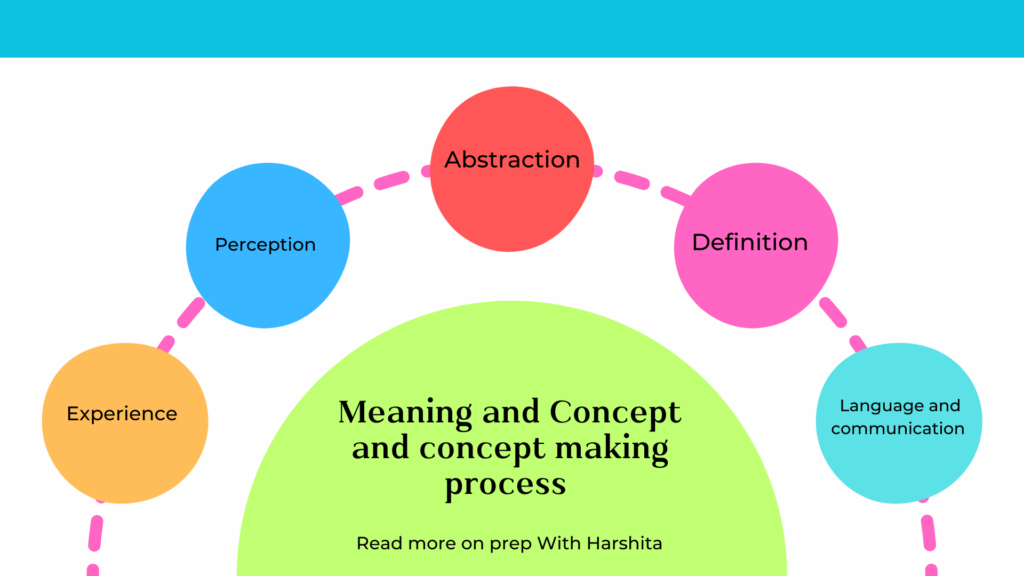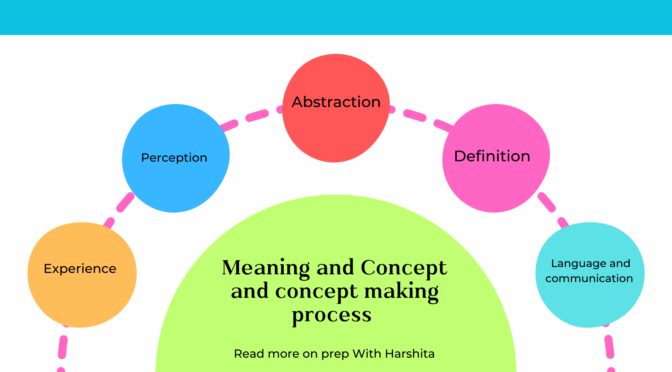A concept is a general idea that represents something in the mind. It is a mental construct that helps individuals understand, categorize, and interpret the world around them. Concepts are fundamental to human cognition and language, as they provide a way to organize and communicate information efficiently.
The concept-making process involves the mental activities and cognitive steps individuals take to form, refine, and utilize concepts. This process can vary depending on the context, but it generally includes the following key steps:
- Perception and Experience: The concept-making process often begins with the perception of objects, events, or experiences in the external world. Individuals gather information through their senses and accumulate experiences that contribute to the formation of concepts.
- Abstraction: Abstraction is the process of distilling essential features or qualities from specific instances to create a generalized representation. For example, from seeing and interacting with various types of chairs, one may abstract the common features that define the concept of a “chair.”
- Categorization: Categorization involves sorting concepts into groups based on shared characteristics or properties. This step helps organize information and simplifies cognitive processing. For instance, animals can be categorized into groups such as mammals, reptiles, and birds.
- Definition: Defining a concept involves clarifying its meaning by specifying its essential features. This step helps establish clear boundaries and criteria for identifying instances of the concept. Definitions contribute to shared understanding and communication.
- Formation of Hierarchies and Relationships: Concepts are often organized hierarchically, with broader, more general categories at the top and more specific subcategories beneath. Relationships between concepts, such as similarities and differences, are identified and understood.
- Language and Communication: Concepts are closely tied to language, and individuals use language to communicate and share their conceptual understanding with others. Language provides a means to express and transmit concepts, facilitating collective understanding within a community.
- Refinement and Adaptation: Concepts are not static; they can evolve, expand, or be refined based on new experiences, information, or perspectives. The concept-making process is ongoing, and individuals continually adjust their conceptual frameworks to accommodate new knowledge.
Also visit: Prep with Harshita

Also Read: Importance of School records and registers


Vibracion mecanica
Equipos de balanceo: importante para el operación fluido y productivo de las equipos.
En el entorno de la avances contemporánea, donde la rendimiento y la confiabilidad del equipo son de máxima trascendencia, los dispositivos de calibración juegan un rol vital. Estos aparatos especializados están desarrollados para equilibrar y fijar componentes giratorias, ya sea en maquinaria de fábrica, vehículos de desplazamiento o incluso en aparatos de uso diario.
Para los profesionales en mantenimiento de aparatos y los profesionales, utilizar con aparatos de equilibrado es esencial para promover el rendimiento fluido y fiable de cualquier mecanismo móvil. Gracias a estas soluciones modernas innovadoras, es posible minimizar sustancialmente las movimientos, el estruendo y la tensión sobre los cojinetes, aumentando la tiempo de servicio de piezas caros.
De igual manera importante es el papel que cumplen los dispositivos de ajuste en la servicio al usuario. El asistencia especializado y el reparación constante aplicando estos aparatos facilitan brindar prestaciones de óptima calidad, incrementando la bienestar de los clientes.
Para los propietarios de emprendimientos, la aporte en unidades de calibración y dispositivos puede ser esencial para mejorar la eficiencia y eficiencia de sus equipos. Esto es principalmente significativo para los emprendedores que dirigen modestas y intermedias organizaciones, donde cada aspecto importa.
También, los aparatos de balanceo tienen una extensa aplicación en el campo de la fiabilidad y el supervisión de excelencia. Posibilitan encontrar eventuales errores, impidiendo intervenciones elevadas y averías a los dispositivos. También, los datos generados de estos aparatos pueden utilizarse para perfeccionar procesos y incrementar la reconocimiento en plataformas de investigación.
Las áreas de uso de los dispositivos de calibración comprenden variadas ramas, desde la fabricación de ciclos hasta el monitoreo de la naturaleza. No influye si se considera de extensas fabricaciones manufactureras o modestos talleres hogareños, los aparatos de calibración son esenciales para promover un rendimiento óptimo y libre de fallos.
Vibracion mecanica
Aparatos de equilibrado: importante para el operación estable y productivo de las máquinas.
En el entorno de la innovación moderna, donde la productividad y la fiabilidad del aparato son de gran importancia, los aparatos de balanceo desempeñan un tarea crucial. Estos aparatos específicos están creados para balancear y asegurar elementos dinámicas, ya sea en dispositivos productiva, transportes de desplazamiento o incluso en aparatos de uso diario.
Para los especialistas en reparación de aparatos y los especialistas, utilizar con aparatos de equilibrado es importante para garantizar el rendimiento uniforme y confiable de cualquier sistema giratorio. Gracias a estas soluciones modernas innovadoras, es posible minimizar considerablemente las oscilaciones, el zumbido y la tensión sobre los sujeciones, extendiendo la vida útil de partes valiosos.
Asimismo trascendental es el función que desempeñan los dispositivos de balanceo en la soporte al cliente. El asistencia experto y el mantenimiento regular usando estos equipos posibilitan brindar prestaciones de excelente excelencia, mejorando la agrado de los usuarios.
Para los responsables de emprendimientos, la contribución en estaciones de ajuste y detectores puede ser fundamental para incrementar la productividad y eficiencia de sus sistemas. Esto es especialmente trascendental para los empresarios que manejan medianas y modestas negocios, donde cada aspecto es relevante.
También, los aparatos de ajuste tienen una extensa implementación en el sector de la protección y el monitoreo de calidad. Permiten localizar probables errores, reduciendo intervenciones onerosas y averías a los equipos. Más aún, los indicadores extraídos de estos aparatos pueden aplicarse para mejorar métodos y mejorar la reconocimiento en plataformas de exploración.
Las sectores de aplicación de los sistemas de ajuste cubren diversas sectores, desde la elaboración de ciclos hasta el supervisión del medio ambiente. No influye si se trata de extensas producciones industriales o pequeños locales hogareños, los sistemas de balanceo son necesarios para asegurar un funcionamiento productivo y libre de paradas.
[b]Eliminate Vibration Issues and Improve Equipment Performance[/b]
Vibration is a silent killer of industrial machines. Imbalance leads to worn-out bearings, misalignment, and costly breakdowns. [b]Balanset-1A[/b] is the ultimate tool for detecting and correcting vibration problems in electric motors, pumps, and turbines.
[b]What Makes Balanset-1A Stand Out?[/b]
– Precise vibration measurement & balancing
– Compact, lightweight, and easy to use
– Two kit options:
[url=https://www.amazon.es/dp/B0DCT5CCKT]Full Kit on Amazon[/url] – Advanced sensors & accessories, Software for real-time data analysis, Hard carrying case
Price: [b]2250 EUR[/b]
[url=https://www.amazon.es/dp/B0DCT5CCKT][img]https://i.postimg.cc/SXSZy3PV/4.jpg[/img][/url]
[url=https://www.amazon.es/dp/B0DCT4P7JR]OEM Kit on Amazon[/url] – Includes core balancing components, Same high-quality device
Price: [b]1978 EUR[/b]
[url=https://www.amazon.es/dp/B0DCT4P7JR][img]https://i.postimg.cc/cvM9G0Fr/2.jpg[/img][/url]
Prevent unexpected breakdowns – Invest in [b]Balanset-1A[/b] today!